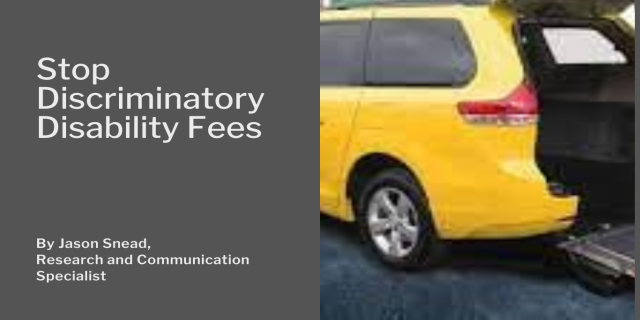Stop Discriminatory Disability Fees

By Jason Snead, Research and Communication Specialist.
The Americans with Disabilities Act (ADA) requires people who have disabilities like me to speak up when they see a violation of the ADA, so we remove as many barriers as possible.
The barrier I had to overcome was transportation.
I live next to a park-and-ride allowing me to have easy access to public transit. However, in this case, it wasn’t so easy. I had to be at a work conference at 8 am and the conference is 26 miles away. If I used public transportation, it would take me 2 hours and 20 minutes due to three bus changes. Not to mention, a 20-minute walk time because of the distance between the three stops. I tried using ride sharing, but Uber and Lyft were unable to provide vehicle with ramps or lifts that I need for my wheelchair.
So, I opted for the more expensive but convenient option of taking an accessible cab. My ride to the conference cost me two dollars a mile plus a $25 loading fee for my wheelchair. An additional $25 loading fee was applied to my return home – costing me a grand total of $154 roundtrip. $50 of that fee was purely due to the disability accommodations I needed. Airfare is cheaper!
I began asking people in the disability community if they experienced the same thing, and many did. They shared with me that there was a recent Arizona agreement in favor of a group of individuals with disabilities against similar “loading” fees. The lawsuit alleged violations of federal and state civil rights laws designed to eliminate disability-based discrimination. The final agreement to eliminate these fees with several transportation companies occurred on April 9, 2020, well before the day of my conference.
The precedent of not charging these fees based on disability clearly was not received by the cab company. It was up to me to not accept these practices as status quo, but to educate myself, and then educate them to make lasting change.
With some assistance from the Arizona Center for Disability Law (ACDL), I was able to inform the cab company that the fee was a violation of the ADA and asked them to adjust their policy. The Company agreed and refunded my fare. The below statement was sent to all dispatchers/ drivers:
|
Comments: Effective immediately, no passenger requesting a wheelchair van paying with cash or credit is to be charged a sur charge of any kind. Any Dispatcher or Driver who does so will be subject to immediate termination. All cash/credit wheelchair transports should be charged the Taxi Street rate of $2.75 pickup and $2.20 per mile. |
I would encourage anybody who encounters a similar situation with “load” fees from transportation companies, to write a letter informing the company/business of the violation. If the company does not respond to your letter 14 to 21 days, you can file a complaint with the Federal Transit Administration (FTA).
Hopefully, loading fees in Arizona will become a distant memory, but that can only happen if we continue to advocate against unfair practices. It is important for us to be at the table when any policies within the private or public sector are discussed – and that includes those on transportation. We need so many more options than what we have.
The more we participate and speak up, the more powerful we will become…and the more we will remove these barriers to our full community participation






